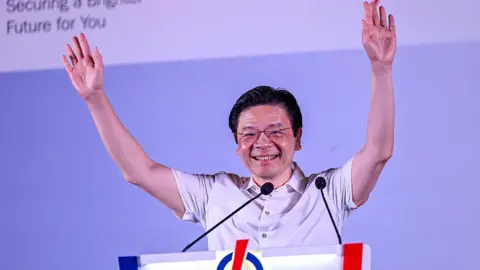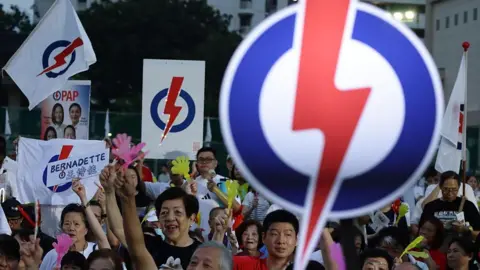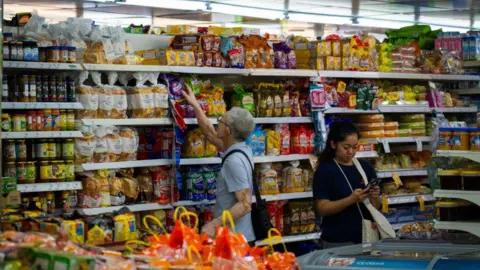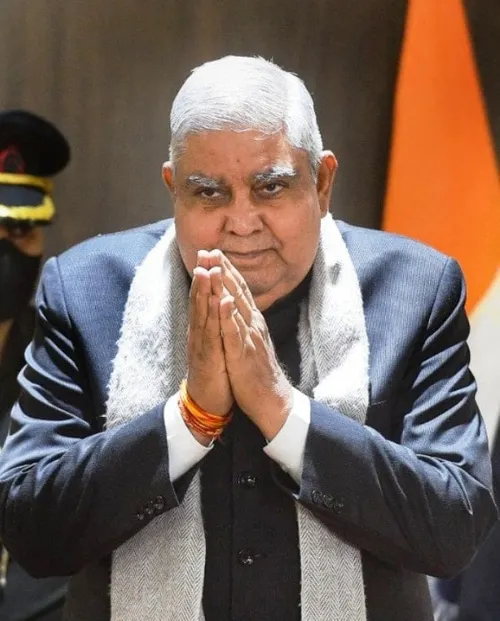 Getty Images
Getty ImagesSingapore’s ruling People’s Action Party (PAP) has won by a landslide in an election dominated by concerns over the cost of living and the country’s future economic stability.
Led by Prime Minister Lawrence Wong in his first election since he became party leader last year, the PAP clinched 65.6% of the vote and an overwhelming majority of the 97 seats in parliament.
Singaporeans went to the polls on Saturday worrying about inflation, wage stagnation and job prospects.
The result will be widely seen as a flight to safety to the PAP amid fears of global turbulence.
“Singapore feels particularly vulnerable given its economy’s size and exposure to international forces… Also we are notoriously risk-averse voters,” said Ian Chong, an associate professor in political science at the National University of Singapore (NUS).
The main opposition, the centre-left Workers’ Party (WP), failed to capture more seats but continued to hold on to its 10 seats in parliament.
The centre-right PAP has governed Singapore continuously since 1959, making it one of the longest-ruling political parties in the world.
It has enjoyed strong support from Singaporeans, particularly from older generations that have seen the country flourish under PAP rule.
But while elections have been free from fraud and irregularities, critics also say the party maintains an unfair advantage through gerrymandering and a tightly controlled media.
In the last three polls prior to Saturday’s result, the PAP saw two of its lowest-ever vote shares, while the WP made increasing inroads in parliament.
But Saturday’s result saw the PAP return to form, as voters gave Wong a strong mandate.
 Getty Images
Getty ImagesWith its open globalised economy, Singapore saw inflation surge in the last few years.
The government has attributed this to external factors such as the Ukraine and Gaza wars and supply chain disruptions. Critics however say a controversial goods and services tax hike exacerbated it.
With the US-China trade war under way and a 10% US tariff looming, authorities and experts have warned of even more shocks to the economy and possibly a technical recession.
Against this backdrop, the PAP campaigned on a message of stability.
Wong repeatedly promised that his team would “steer Singapore through the storm”, while warning that if more opposition MPs were elected, he would lose capable ministers at a time when good governance was most needed.
It was a message that resounded with many voters. One PAP supporter, a start-up owner who only wanted to be known as Amanda, told the BBC that her business has been affected with clients pausing some projects due to the economic climate.
“The headwinds are not great, there’s a lot of uncertainty… I want a party with experience [running the government],” she said.
Though the PAP saw a series of scandals in recent years, including one involving a cabinet minister, this was hardly a talking point during the election period. Analysts said it was further from people’s minds given more immediate concerns about the economy.
 Getty Images
Getty ImagesSome see the result as a sign of confidence in Wong, who led Singapore’s Covid taskforce and became a familiar face as he regularly addressed the public during the pandemic.
“He’s shown that he is capable, with the Covid taskforce giving him credence. He was the guiding hand on that rudder… and he projects that stability for future global financial uncertainties,” said Rebecca Tan, a political science lecturer with NUS.
Wong is the first PAP prime minister to have improved the party’s vote share in his first election. Previous PMs saw dips in the polls in what analysts used to call the “new PM” effect”, or a reflection of voters’ uncertainty in a new leader.
The PAP’s strong result was also partly due to a fragmented opposition, with 10 parties going up against them. With few exceptions, most performed poorly.
Teo Kay Key, a research fellow at the think tank Institute of Policy Studies, said that despite recent elections showing there was a desire for political diversity, the latest result “shows that people are happy with the number of opposition MPs” for now.
But, she added, Singaporeans also “seem to be more selective” now when it comes to casting votes for the opposition, pointing to the WP’s performance.
The WP had campaigned on a platform of lowering the cost of living and strengthening the safety net.
While it failed to win more seats, it also saw increased vote shares in the constituencies it retained and close fights with the PAP in others, cementing its status as the country’s strongest opposition party.
It turned in a robust performance despite recent controversial cases involving a former Workers’ Party MP and WP leader Pritam Singh, who were both found guilty of lying to parliament. Many in the WP’s support base believe the case, against Singh especially, was politically motivated.
Addressing supporters shortly after the results for his constituency were declared, Singh acknowledged that “it was always going to be a difficult election”.
But he added: “The slate is wiped clean, we start work again tomorrow, and we go again.”
 Getty Images
Getty ImagesAnurag Dhole is a seasoned journalist and content writer with a passion for delivering timely, accurate, and engaging stories. With over 8 years of experience in digital media, she covers a wide range of topics—from breaking news and politics to business insights and cultural trends. Jane's writing style blends clarity with depth, aiming to inform and inspire readers in a fast-paced media landscape. When she’s not chasing stories, she’s likely reading investigative features or exploring local cafés for her next writing spot.







